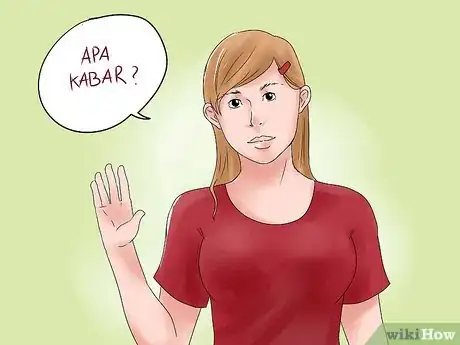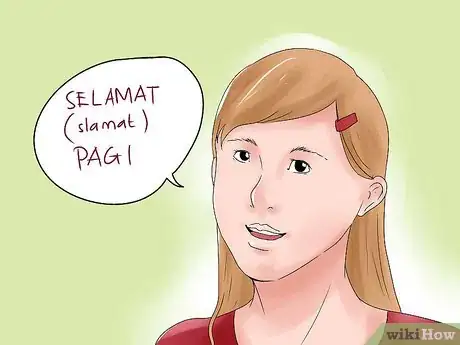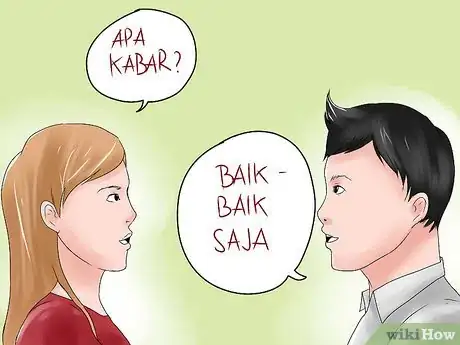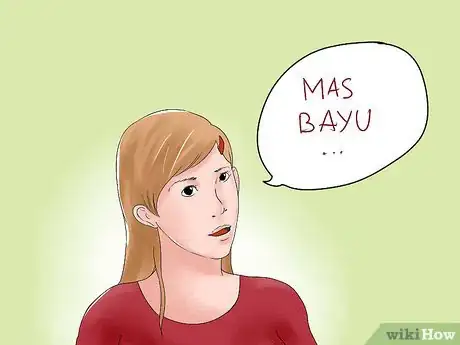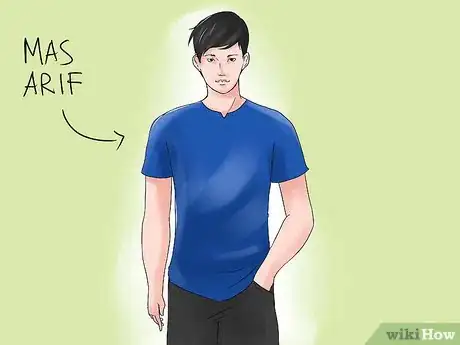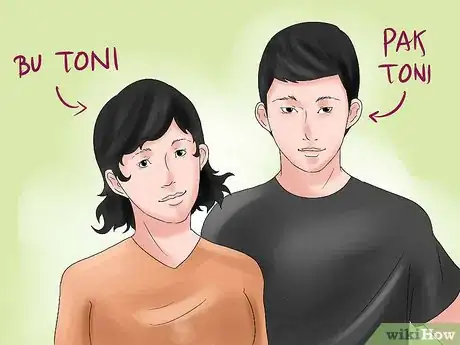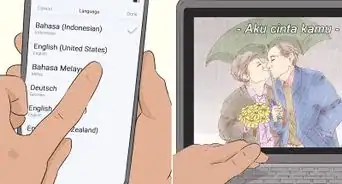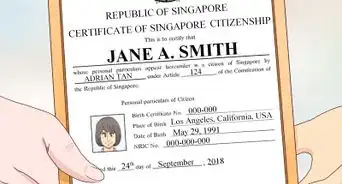This article was co-authored by wikiHow staff writer, Jennifer Mueller, JD. Jennifer Mueller is a wikiHow Content Creator. She specializes in reviewing, fact-checking, and evaluating wikiHow's content to ensure thoroughness and accuracy. Jennifer holds a JD from Indiana University Maurer School of Law in 2006.
wikiHow marks an article as reader-approved once it receives enough positive feedback. In this case, 80% of readers who voted found the article helpful, earning it our reader-approved status.
This article has been viewed 294,683 times.
Learn more...
Here you are, in Indonesia, which is under the equator in Southeast Asia. It is the home of wondrous spices, exotic jungles and a smiling people as warm as their tropical climate. While many Indonesians can communicate in English, you can always impress them by greeting them using Bahasa Indonesia, their native tongue.[1]
Steps
-
1For greetings, you can always say a simple ‘Hi’ or ‘Hello’. In non-formal situations, you might say ‘Apa Kabar?’ (How are you?). More formally, you might want to use ‘Selamat Pagi’ in place of Good Morning, ‘Selamat Siang’ for Good Afternoon, ‘Selamat Sore’ for Good Evening, and ‘Selamat Malam’ for Good Night.Selamat malam is not used if you want to go to sleep.[2]
-
2Note that the 'e' in 'Selamat' is not pronounced. To pronounce it correctly simply say 'slamat'. Also its perfectly OK to omit the 'selamat' completely and simply say 'pagi'. Similar to English where Good Morning is abbreviated into 'Morning.Advertisement
-
3If you greet a person using ‘Apa Kabar?’ ('How are you?'), the answer will most likely be ‘Baik-baik saja’ or ‘Kabar baik’ which means ‘I’m fine, thank you.’[3]
-
4Bahasa Indonesia is usually read and pronounced phonetically. Say it the way you see it. Rarely will anyone laugh if you accidentally slip. Just continue on speaking in your usual accent and you'll eventually get it right.
-
5In most polite situations, use the honorifics ‘Mas’ or ‘Pak’ or ‘Bu’ or 'Mba' (spelled embak) before a person’s name. ‘Mas’ meaning one younger than you, 'Pak', sir or mister (Can be used to address any male, except boys, which would be 'Mas') 'Ibu' is also used everyday, such as "Hai, Ibu!" Abbreviation is used normally, Indonesians constantly shorten things. "Bu" is an abbreviation of Ibu. Ex: Mas Bayu (young male); Pak Mulyawan (male, formal) ; Bu Kartini (married female); Mba Elita (Ms. Elita). While for married females the honorific 'Ibu' does not often change, you might also hear ‘Bapak’ (father) when a young person speaks to a male who’s clearly older or has higher position. Ex: a person middle-aged person named Djoko might be addressed as 'Bapak Djoko.'[4]
- The K and the NG are the only 2 somewhat tricky sounds of Bahasa Indonesia. The former has a dual function. Sometimes it sounds exactly like the K in English, while at other times (like in Pak) it marks a 'glottal stop:' a glottal stop is the opposite of the ahhhh-sound, as you intentionally choke off the air in your throat to end the syllable. It sounds like the Uh in Uh-oh! The second is the NG combination which produces a "velar nasal" sound similar to the way you would pronounce 'sing.' All that said, it is a minor matter that the Locals will tolerate until you eventually refine it as you learn more of the language.
-
6The Indonesian way for naming does not always use the surname or family name. If a person is named ‘Arif Perdana,’ it does not mean his family name is Perdana. Feel free to call him with just ‘Pak Arif’. Some Indonesians are even named with one single first name, without middle name or family name.[5]
-
7Don’t be offended if an Indonesian you barely know addresses you by your first name. Indonesian people use first name basis in daily life, with whomever they meet. The exceptions are married women, nobles and royalty.
-
8Married women will likely be using their husband’s name, but in the way they like. Use the name she told you when you were introduced to her. Don’t forget to add ‘Bu/Ibu’ before you speak her name.
-
9Speak in English if you get suddenly stuck and don’t know what to do or to say. Experience shows that Indonesians are very intuitive communicators who can make out what you're trying to say, regardless.
-
10Smile when you speak. Indonesians are as a whole, open and friendly people. Smiles will do magic to oil social interactions with them. A slight nod/bow is also a common practice. The bowing should not be equated with subservience, but with extreme politeness. Westerners should not let it bother them.
Community Q&A
-
QuestionHow do I address a young girl?
 Community AnswerIn formal Indonesian: "Nona" (it means "Miss"), but most people use the area's respective traditional language - usually the word that means "older sister." For example, in Central Java & East Java, we say "Mbak" and sometimes "Ning," in West Java, we say "Teh" or "Teteh," in Jakarta we say "Neng."
Community AnswerIn formal Indonesian: "Nona" (it means "Miss"), but most people use the area's respective traditional language - usually the word that means "older sister." For example, in Central Java & East Java, we say "Mbak" and sometimes "Ning," in West Java, we say "Teh" or "Teteh," in Jakarta we say "Neng." -
QuestionHow do I address a woman (business contact) informally to say, "How are you?"
 Lord ElrondCommunity AnswerYou can say it as, "Apa kabar anda?" for a formal meeting. For an informal greeting, just say, "Hai! Oke oke aja kan?"
Lord ElrondCommunity AnswerYou can say it as, "Apa kabar anda?" for a formal meeting. For an informal greeting, just say, "Hai! Oke oke aja kan?" -
QuestionHow can I say "My greetings and wishes to your family"?
 Community AnswerYou could say "Salam saya ke keluarga Anda" which literally means "My greetings to your family." Wishes isn't included in the sentence because "salam" is already considered "greetings and wishes" in Indonesian.
Community AnswerYou could say "Salam saya ke keluarga Anda" which literally means "My greetings to your family." Wishes isn't included in the sentence because "salam" is already considered "greetings and wishes" in Indonesian.
References
- ↑ https://www.bbc.co.uk/news/world-asia-pacific-14921238
- ↑ https://en.wikibooks.org/wiki/Indonesian/Lessons/Greetings
- ↑ https://www.omniglot.com/language/phrases/indonesian.php
- ↑ http://factsanddetails.com/indonesia/People_and_Life/sub6_2a/entry-3988.html
- ↑ https://www.vice.com/en_asia/article/j5xmgp/the-uniquely-indonesian-pains-of-having-only-one-name
